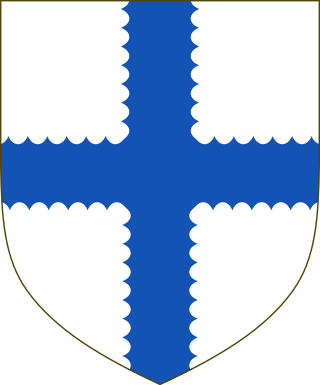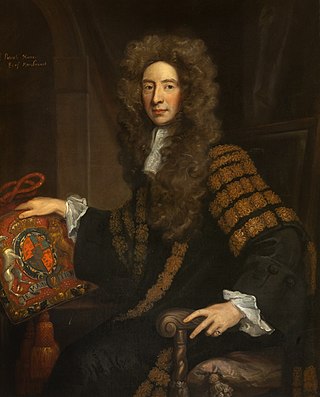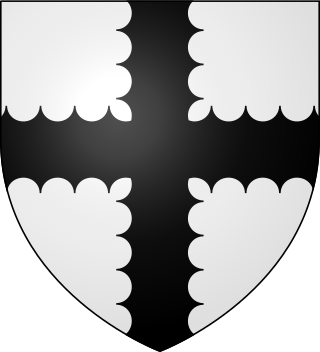Related Research Articles
William Sinclair (1410–1480), 1st Earl of Caithness (1455–1476), last Earl (Jarl) of Orkney, 2nd Lord Sinclair and 11th Baron of Roslin was a Norwegian and Scottish nobleman and the builder of Rosslyn Chapel, in Midlothian.

Lord Sinclair is a title in the Peerage of Scotland. According to James Balfour Paul's The Scots Peerage, volume VII published in 1910, the first person to be styled Lord Sinclair was William Sinclair, 3rd Earl of Orkney and 1st Earl of Caithness. However, according to Roland Saint-Clair writing in the late 19th century, William Sinclair's father, Henry II Sinclair, Earl of Orkney, who died in 1420, is the first person recorded as Lord Sinclair by public records.

Lord Polwarth, of Polwarth in the County of Berwick, is a title in the Peerage of Scotland. It was created in 1690 for Sir Patrick Hume of Polwarth, 2nd Baronet, Lord Chancellor of Scotland from 1696 to 1702. In 1697 he was further created Lord Polwarth, of Polwarth, Redbraes and Greenlaw, Viscount of Blasonberrie and Earl of Marchmont, also in the Peerage of Scotland. Upon the death of his grandson, the third Earl, the creations of 1697 became dormant (unclaimed).

Patrick Hume, 1st Earl of Marchmont, known as Sir Patrick Hume, 2nd Baronet from 1648 to 1690 and as Lord Polwarth from 1690 to 1697, was a Scottish statesman. His grandfather was the poet and courtier Sir Patrick Hume of Polwarth and Redbraes who died in 1609.

Baron of Roslin or Rosslyn was a Scottish feudal barony held by the St Clair or Sinclair family.
Sir James Dalrymple, 2nd Baronet was Member of Parliament for Haddington Burghs and the Principal Auditor of the Exchequer in Scotland.
Sir Patrick Hume, of Polwarth and Redbraes was a Scottish landowner, courtier and makar.

Hugh Hume-Campbell, 3rd Earl of Marchmont PC FRS, styled Lord Polwarth between 1724 and 1740, was a Scottish politician who sat in the House of Commons from 1734 until 1740 when he succeeded to the peerage as Earl of Marchmont. He sat in the House of Lords as a representative peer from 1750.

Henry Sinclair was a Scottish noble and the 4th Lord Sinclair. In The Scots Peerage by James Balfour Paul he is designated as the 3rd Lord Sinclair, but historian Roland Saint-Clair designates him the 4th Lord Sinclair and references this to an Act of the Scottish Parliament in which he was made Lord Sinclair based on his descent from his great-grandfather, Henry II Sinclair, Earl of Orkney, the first Lord Sinclair. Bernard Burke, in his a Genealogical and Heraldic Dictionary of the Peerage and Baronetage of the British Empire, agrees with Roland Saint-Clair and says that Henry Sinclair was "in reality" the fourth holder of the title of Lord Sinclair.

William Sinclair was a Scottish nobleman and the 5th Lord Sinclair. In The Scots Peerage by James Balfour Paul he is designated as the 4th Lord Sinclair in descent starting from William Sinclair, 1st Earl of Caithness and 3rd Earl of Orkney, but historian Roland Saint-Clair designates him as the 5th Lord Sinclair in descent from the father of the 1st Earl of Caithness and 3rd Earl of Orkney, Henry II Sinclair, Earl of Orkney, who is the first person recorded as Lord Sinclair in public records. Roland Saint-Clair references this to an Act of the Scottish Parliament in which the 4th Lord Sinclair was made Lord Sinclair based on his descent from his great-grandfather, Henry II Sinclair, Earl of Orkney, the first Lord Sinclair. Bernard Burke, in his a Genealogical and Heraldic Dictionary of the Peerage and Baronetage of the British Empire, agrees with Roland Saint-Clair and says that William Sinclair was "in reality" the fifth Lord Sinclair.
Henry St Clair, Lord Herdmanston and Carfrae, was a Scottish noble of the 12th century.

Patrick Sinclair was a Scottish nobleman and the 9th Lord Sinclair. In The Scots Peerage by James Balfour Paul he is designated as the 8th Lord Sinclair in descent starting from William Sinclair, 1st Earl of Caithness and 3rd Earl of Orkney, but historian Roland Saint-Clair designates him as the 9th Lord Sinclair in descent from the father of the 1st Earl of Caithness and 3rd Earl of Orkney, Henry II Sinclair, Earl of Orkney, who is the first person recorded as Lord Sinclair in public records. Roland Saint-Clair references this to an Act of the Scottish Parliament in which the 4th Lord Sinclair was made Lord Sinclair based on his descent from his great-grandfather, Henry II Sinclair, Earl of Orkney, the first Lord Sinclair. Bernard Burke, in his a Genealogical and Heraldic Dictionary of the Peerage and Baronetage of the British Empire, agrees with the numbering by Roland Saint-Clair and says that Henry Sinclair and William Sinclair were "in reality" the fourth and fifth Lords Sinclair respectively.

John Sinclair was a Scottish nobleman and the 10th Lord Sinclair. In The Scots Peerage by James Balfour Paul he is designated as the 9th Lord Sinclair in descent starting from William Sinclair, 1st Earl of Caithness and 3rd Earl of Orkney, but historian Roland Saint-Clair designates him as the 10th Lord Sinclair in descent from the father of the 1st Earl of Caithness and 3rd Earl of Orkney, Henry II Sinclair, Earl of Orkney, who is the first person recorded as Lord Sinclair in public records. Roland Saint-Clair references this to an Act of the Scottish Parliament in which the 4th Lord Sinclair was made Lord Sinclair based on his descent from his great-grandfather, Henry II Sinclair, Earl of Orkney, the first Lord Sinclair. Bernard Burke, in his a Genealogical and Heraldic Dictionary of the Peerage and Baronetage of the British Empire, agrees with the numbering by Roland Saint-Clair and says that Henry Sinclair and William Sinclair were "in reality" the fourth and fifth Lords Sinclair respectively.

Lord Herdmanston was a title in the Peerage of Scotland that was held by the Sinclair or St Clair family.
William St Clair, Lord Herdmanston, Baron of Carfrae and Cessford, was a Scottish noble of the 13th-14th century.
William St Clair, Lord Herdmanston, Baron of Carfrae and Cessford, was a Scottish noble of the 14th century.
John St Clair, Lord Herdmanston, Baron of Carfrae and Cessford, was a Scottish noble of the 14th century.
Lt.-Col. Charles St Clair, 13th Lord Sinclair was a Scottish noble and representative peer.
Maj. James St Clair, 14th Lord Sinclair was a Scottish noble and representative peer.
Andrew Hume, Lord Kimmerghame MP (1676–1730) was a Scottish judge and Senator of the College of Justice. He also held several politic roles including member for Kirkcudbright.
References
- Burke, Bernard (1885). Burke's Genealogical and Heraldic History of the Peerage, Baronetage and Knightage. Burke's Peerage Limited.